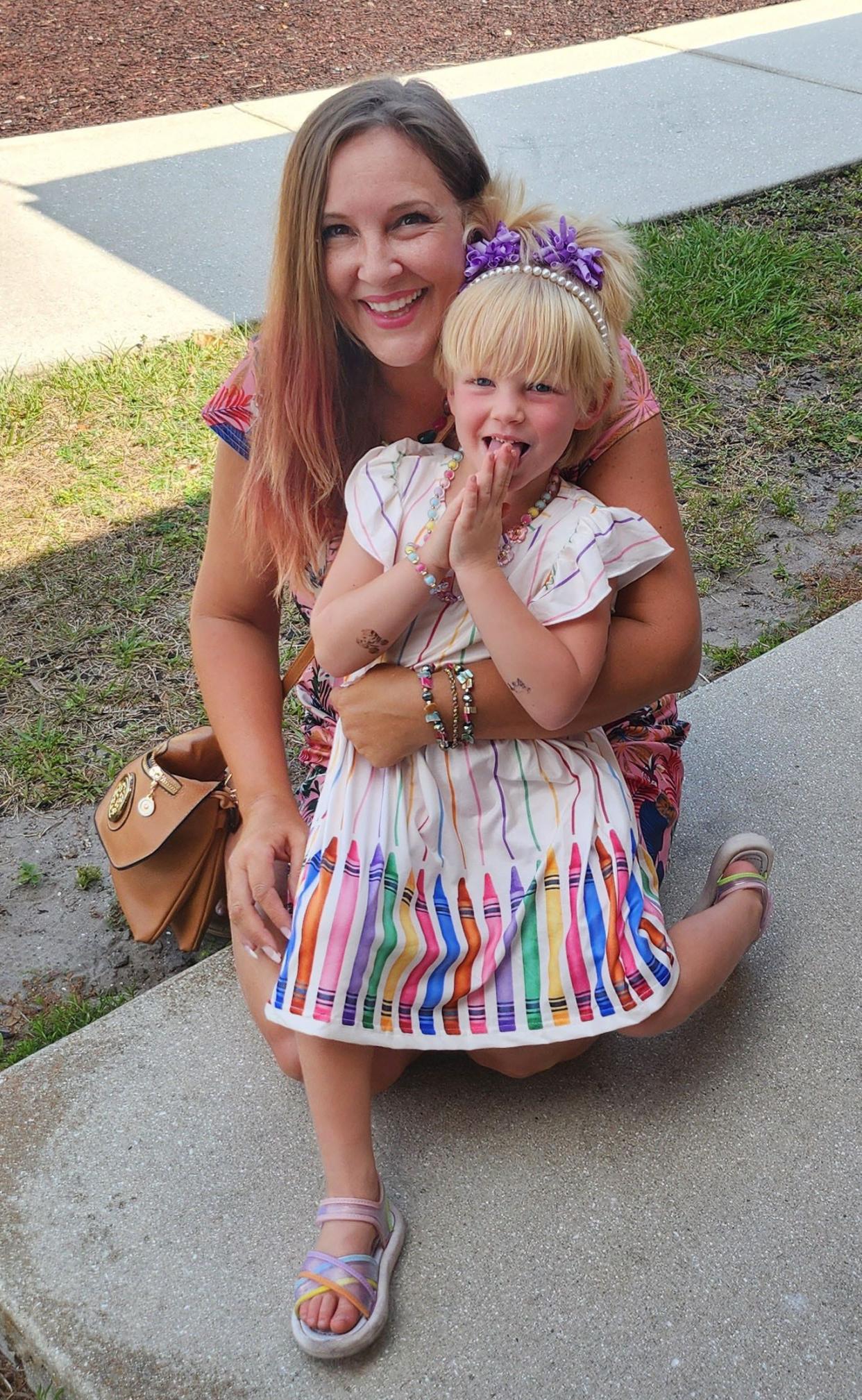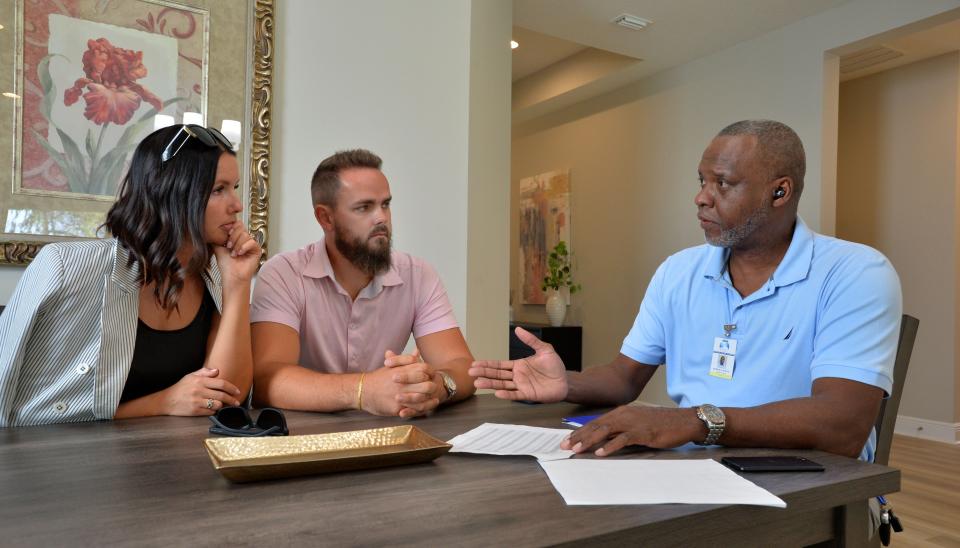Landlords wanted: Sarasota officials recruit for affordable housing voucher program

With a divorce behind her and her credit in disarray, Dana Landin has spent months at homeless shelters, unable to afford area rents.
Once an executive recruiter with a six-figure salary and a cute home of her own, the 47-year-old Sarasota native is now collecting disability for a connective tissue disorder and other ailments.
After finally obtaining a Housing Choice Voucher, formerly called Section 8, she felt at first like she’d hit the Lotto. At last, she thought, she could provide stability to her daughter Zoey, age 4.
Instead, like hundreds to thousands of voucher holders, Dana found her nightmare dragging on.
Some qualified places looked unsafe. Other rentals were beyond the program’s price cap. And many private landlords wouldn’t accept the voucher at all.
“I think people have a preconceived notion about who receives Section 8,” Landin said about negative impressions she once shared. “But life can change in an instant.”
Affordable Housing: Another group squeezed by Sarasota's housing crisis – young professionals
A tough market
In an effort to help thousands of struggling families through the housing crisis, the Sarasota Housing Authority, or SHA, has launched a major drive to recruit more landlords into the voucher program.
From hiring a new landlord liaison to offering financial incentives to property owners to revamping its website, the SHA hopes to get more families into homes they can afford.
The almost 600 landlords currently renting to nearly 1,900 voucher-holding households are critical to the area’s housing stock and economy, said William Russell, the SHA’s president and CEO.
“As a group, they are the largest providers of affordable housing in our community,” Russell said.
Another 1,300 applicants remain on the waiting list, faced with a one- to four-year wait before receiving a voucher.
When they do get a voucher, there is no guarantee they will find a home with it.
Following the pandemic’s onset, as rents soared along with demand, many landlords turned voucher-holders away, able to pick and choose from a large pool of candidates.
By the end of last year, success rates of applicants finding a landlord to accept their voucher within four months plummeted to 56%.

“In my 18 years here, I’ve never seen the market this tough,” Russell said.
Among SHA’s new initiatives, the creation of a landlord liaison post was rooted in HUD research showing that a designated contact could overcome stiff bureaucratic barriers to landlord participation.
The stakes are high. While other affordable housing proposals can take years to get off the ground, the voucher program holds promise to help thousands of hurting residents right away.
“The more landlords we get,” Russell said, “the more families we serve.”
How it works
On a recent morning, Derrick Kirce folds his six-foot-six frame into the city-owned Ford Escape.
As the new SHA landlord liaison, the Sarasota basketball legend and University of Tennessee at Chattanooga Hall of Famer scours city neighborhoods and suburbs, seeking houses, duplexes, quads or apartments to recruit to the voucher program.
“There is a lot of stock out there,” he says of the county – a place that has transformed before his eyes since his return home from an athletic career abroad to work in social services.
One of his goals is to encourage landlords to move past negative stereotypes of voucher holders – to see them as fellow residents set back by health issues or struggling with soaring costs even as they work two or three jobs.
While a third of voucher holders are disabled or elderly residents, most are working families, according to Jeremy White, SHA’s housing choice voucher program director.

“It’s amazing,” says Kirce, “that $65,000 is not considered a living wage in this community for a family with four kids.”
Kirce pulls into the Hidden Creek community east of I-75 to meet with a couple that at first planned to sell their three-bedroom, two-bathroom house. After delays, they decided to rent, calling the housing authority to ask about the voucher program.
As he does with all inquiries, Kirce was quick to phone them back. He gives out his cell number and follows up with emails, walking prospective landlords through the entire process.
Whether one-on-one or in community presentations, Kirce stresses the benefits of renting to voucher holders, including guaranteed rent payments deposited by SHA the first of the month into the landlord’s bank account; rent amounts equal or close to market rates; a streamlined approval process; and financial incentives of $500 for each new leased signed with voucher-holders.
After several conversations with Kirce, the couple said they wanted to give it a try.
Soon, the couple was contacted by a woman who will become their new tenant: a working single mother with four children.
For Lamarr James, SHA’s intake specialist, that moment, he knows, can represent enormous relief for the desperate parents calling him each day – some of them sleeping in cars with their kids.
“They break down crying,” James said. “They’ve been waiting so long.”
Housing Crisis: Live Local Act brings potential relief, problems for affordable housing in Sarasota County
Hope at your doorstep
James has especially hopeful advice for people who are already in a home before they go searching for a new place that will accept their voucher.
Try your current landlord, he tells them.
That’s what happened with Tim Donaghy.
A Sarasota landlord for about 14 years, he rents a dozen homes in the city to middle- and lower-middle-class families. Recently, when a favorite tenant approached him nearly in tears, asking if he would take her voucher, he readily looked into it.
The woman and her husband, both professionals – with five children excelling at school – had been working multiple jobs to keep up with rent for the four-bedroom house.
For years, Donaghy resisted raising it to keep them as tenants. But finally, as his expenses rose, too, he brought it close to $2,500 a month – a good $1,000 less than what comparable units were charging.
“People in this area seem to be frustrated with landlords because of the rents, but the taxes have skyrocketed, the insurance has skyrocketed, even something simple like a repair for the AC has skyrocketed,” he said.
“The profit margin is not as high as people think.”
When the tenant’s number came up for a voucher, it promised help to them both: higher rent payments for him, while the family’s obligation was cut in half.
But Donaghy had one big misgiving: dealing with the housing authority.
“In the past, I would email someone and not hear back for two or three days about a question on a tenant or whatever situation,” he said. “You would call and someone wouldn’t call you back, and it would be very very frustrating.”
With Kirce, though, he found that the office has turned around.
“That seems to have changed tenfold,” he said about communication and assistance to landlords.
The difference is reflected in the numbers. Following Kirce’s hiring and other initiatives, the success rate of voucher holders getting leased within four months rose from that 56% low point in December to the current rate of 76%.
Donaghy accepted the voucher from his favorite tenant, telling Kirce that the second he has another open unit, he will give him a call.
“Derrick really advocates for these families,” he said. “It makes you want to try to do your part in helping these families out.”
Empowering both sides
Other landlords are less convinced about the program.
Bissell Bissell, a colleague of Donaghy’s in Sarasota, said in his nearly 16 years of renting and managing properties, many of his voucher-holding tenants left major damage behind, sometimes in the thousands of dollars.
The problem, he says, revolves around deposits. Since the SHA can't assist with them, many tenants with vouchers turn to nonprofits for help. But the money is not theirs to get back, Bissell noted, leaving little to deter the destruction of property.
"The deposit works as incentives," he said, suggesting more reforms.
Kirce is addressing that by coaching landlords on how to fortify leases.
He advises them not to wait until the lease expires and tenants move out before contacting SHA, when at that point, there's little it can do. Instead, he shows them ways to insert clauses that call for landlord inspections every few months or reasons to enter the home for things like changes to air filters.
“We want to empower them to monitor their property throughout the year,” Kirce said.
While the SHA is not a property manager, as soon as problems are flagged by landlords, it can intervene with a special inspection -- holding tenants responsible for repairs or threatening to revoke their voucher.
Likewise, he works with tenants, educating them on the rules of the program, encouraging active communication with landlords and how to report violations from their end as well.
For the most part, Kirce adds, voucher holders are hardworking and conscientious. The last thing they want to do – with so much on the line, after waiting so long to get one – is to put their voucher at risk.
Report: Almost half of households in Sarasota-Manatee region live paycheck-to-paycheck
'Best day of my life'
Dana Landin's own search for a rental had been fruitless, costing hundreds of dollars in lost rental application fees.
Even from Kirce’s list, several of the addresses led to dead ends. Every day she had been calling SHA, hyperventilating, despairing in her search for a home for herself and daughter, Zoey.
The last place on the list was a two-bedroom house in North Port. It had a backyard and was in a family-friendly neighborhood, with sidewalks, close to parks and in a good school district.
The owner had talked to Kirce and decided to open it up to voucher holders. The landlord wanted to meet her.
By mid-June she was signing a lease and moving in – the rent at $1,600 a month, her share a little over $600.
A nonprofit and Season of Sharing helped cover the deposit and first month's rent. Now housed with the voucher, Landin eventually will be able to apply it to the Homeownership Program.
Her gratitude to SHA and landlords moved her to tears.
The first night in the house, after a bath and being tucked in, 4-year-old Zoey told her mother this was the best day of her life.
“I’m confident that this move will change our lives for the better,” Landin said. “SHA saved my sanity. And they gave us hope where we had lost it.”
This story comes from a partnership between the Sarasota Herald-Tribune and the Community Foundation of Sarasota County. Saundra Amrhein covers the Season of Sharing campaign, along with issues surrounding housing, utilities, child care and transportation in the area. She can be reached at samrhein@gannett.com.
This article originally appeared on Sarasota Herald-Tribune: Sarasota officials recruit landlords for housing voucher program

